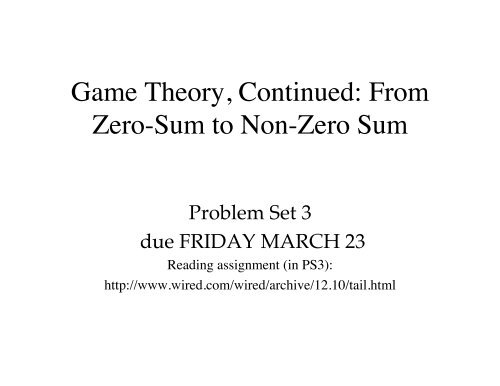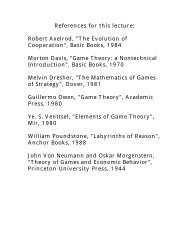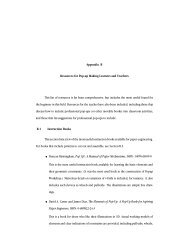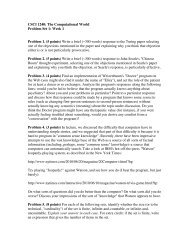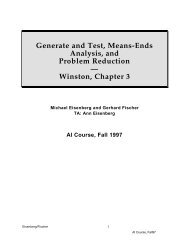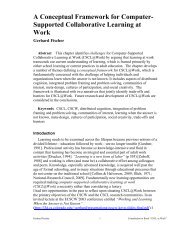Game Theory, Continued: From Zero-Sum to Non-Zero Sum
Game Theory, Continued: From Zero-Sum to Non-Zero Sum
Game Theory, Continued: From Zero-Sum to Non-Zero Sum
- No tags were found...
Create successful ePaper yourself
Turn your PDF publications into a flip-book with our unique Google optimized e-Paper software.
<strong>Game</strong> <strong>Theory</strong>, <strong>Continued</strong>: <strong>From</strong><strong>Zero</strong>-<strong>Sum</strong> <strong>to</strong> <strong>Non</strong>-<strong>Zero</strong> <strong>Sum</strong>Problem Set 3!due FRIDAY MARCH 23!Reading assignment (in PS3):http://www.wired.com/wired/archive/12.10/tail.html!
<strong>Game</strong> <strong>Theory</strong>: Basic Taxonomy • <strong>Zero</strong>- vs. non-zero sum • Two- vs. N-person games • Finite vs. infinite number of choices • Iterated vs. non-iterated games • <strong>Game</strong>s of perfect information
Two-Person <strong>Zero</strong> <strong>Sum</strong> <strong>Game</strong>s • The notion of a dominant choice • The solution of a zero-sum game – The value of a game – The minimax theorem • Pure vs. Mixed strategies
Blue 4 5 9 3 Worst I can do Red 8 4 3 7 7 6 8 9 7 2 4 6 Worst I can do
Scissors Paper S<strong>to</strong>ne Scissors 0 1 -1 Paper -1 0 1 S<strong>to</strong>ne 1 -1 0
A <strong>Non</strong>-<strong>Zero</strong>-<strong>Sum</strong> <strong>Game</strong> Blue Red 8 4 6 2 5 7 4 8
Blue Red 5 6 3 7 7 2 9 8
Clyde Clam up Bonnie S<strong>to</strong>ol Pigeon Clam up 1 year 1 year 0 years 20 years S<strong>to</strong>ol Pigeon 20 years 0 years 10 years 10 years
Blue Cooperate Red Defect Cooperate 3 3 5 0 0 5 1 1 Defect
Blue Red 6 6 7 4 4 7 -3 -3
Blue Red 3 3 3 1 1 3 0 0
Blue Red 4 4 3 1 1 3 0 0
The Ultimatum <strong>Game</strong>: addingintangibles <strong>to</strong> a utility function • Two players, Red and Blue. Red is given$1000 and is <strong>to</strong>ld that he can choose anamount <strong>to</strong> be taken out of this <strong>to</strong>tal <strong>to</strong> offerBlue. Blue then chooses whether <strong>to</strong> acceptthis amount or not. • If Blue rejects Reds offer, both get nothing.
Axelrods idea: hold a computer <strong>to</strong>urnament in which each contestant is a program that will play a series of rounds of the Prisoners Dilemma game. Researchers can send in a program <strong>to</strong> enter in the <strong>to</strong>urnament: each program will play all the others in a series of about 100 successive rounds of the PD game.
Some Simple Axelrod-Tournament-like strategies • All-Defect simply defects on every round • Poor-Trusting-Fool simply cooperates onevery round • Random is a test strategy that simplycooperates or defects randomly • Unforgiving cooperates initially until thefirst time that the other player defects; afterthat, Unforgiving defects forever
The Tit-for-Tat Strategy • Tit-for-Tat cooperates on the first round.Thereafter, on every subsequent round, itsimply imitates what the other player did onthe previous round. (That is, Tit-for-Tatdoes at round N what the other player did atround N-1.)
A British staff office on a <strong>to</strong>ur of the trenchesremarked that he was as<strong>to</strong>nished <strong>to</strong> observe German soldiers walking about withinrifle range behind their own line. Our men appeared <strong>to</strong> takeno notice. I privately made up my mind <strong>to</strong> do away with thatsort of thing when we <strong>to</strong>ok over; such things should not beallowed. These people evidently did not know there was awar on. Both sides apparently believed in the policy of liveand let live. Dugdale 1932, quoted in Axelrod, p. 74
The high commands of the two sides did notshare the view of the common soldier whosaid: The real reason for the quietness of some sections ofthe line was that neither side had any intention ofadvancing in that particular district... If the Britishshelled the Germans, the Germans replied, and thedamage was equal: if the Germans bombed anadvanced piece of trench and killed fiveEnglishmen, an answering fusillade killed fiveGermans.Bel<strong>to</strong>n Cobb 1916,quoted in Axelrod p. 76
The ethics that developed are illustrated in thisincident, related by a British officer recallinghis experience while facing a Saxon unit of theGerman Army. I was having tea with A Company when we heard alot of shouting and went out <strong>to</strong> investigate. We foundour men and the Germans standing on their respectiveparapets. Suddenly a salvo arrived but did no damage.Naturally both sides got down and our men startedswearing at the Germans, when all at once a braveGerman got on <strong>to</strong> his parapet and shouted out We arevery sorry about that; we hope no one was hurt. It isnot our fault, it is that damned Prussian artillery. Rutter 1934, quoted in Axelrod, p. 85


